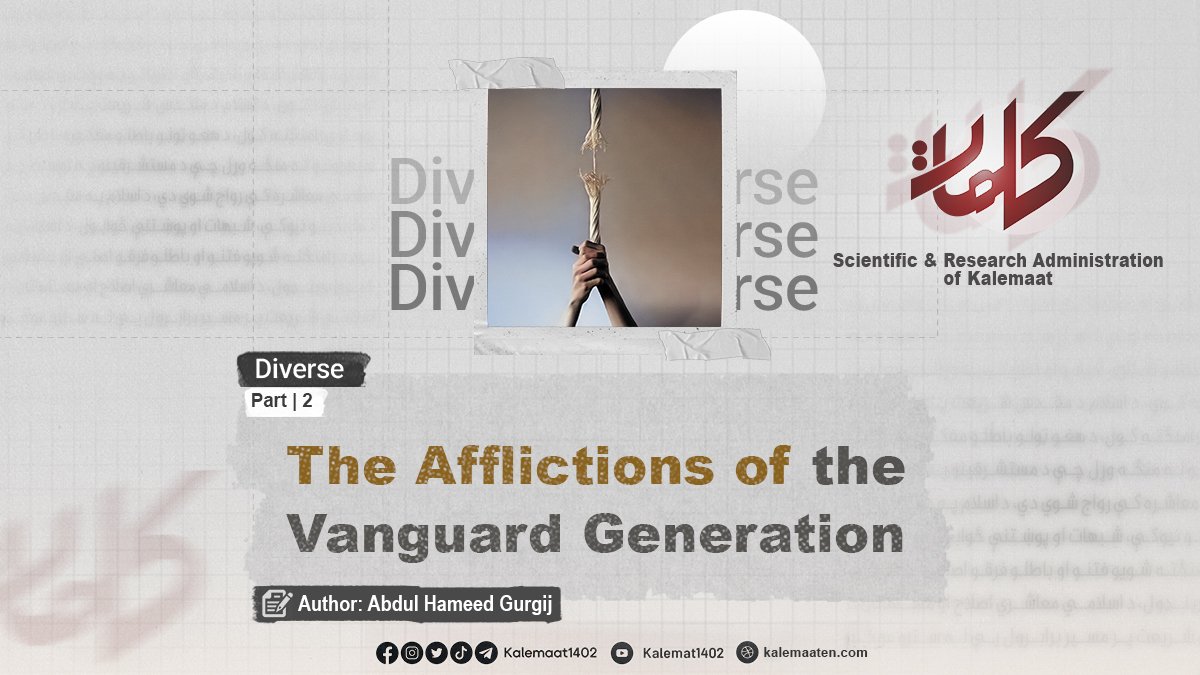Author: Abdul Hameed Gurgij
The Afflictions of the Vanguard Generation (Part Two)
Lack of Reflection and Contemplation on Its Verses
The Qur’an is a book meant for deep reflection. Mere recitation without contemplation cannot guide one toward the true objectives of the Qur’an. In fact, the Qur’an was revealed for the purpose of pondering: “كِتَابٌ أَنزَلْنَاهُ إِلَيْكَ مُبَارَكٌ لِيَدَّبَّرُوا آيَاتِهِ” Translation: This is a blessed Book which We have revealed to you, [O Muhammad], so that they may reflect upon its verses. [1]
The Qur’an reproaches those who neglect reflection, stating: “أَفَلَا يَتَدَبَّرُونَ الْقُرْآنَ أَمْ عَلَىٰ قُلُوبٍ أَقْفَالُهَا” Translation: Do they not reflect upon the Qur’an, or are there locks upon [their] hearts? [2]
An overemphasis on pronunciation and recitation, rushing to complete chapters, ignoring the meaning during recitation, and neglecting to promote a culture of deep reflection—especially in academic and religious institutions—are all forms of forsaking the Qur’an.
Secularizing and De-sacralizing the Qur’an
On one end of the spectrum are those who present the Qur’an as something distant and intimidating, discouraging others from engaging with it. Unfortunately, this has driven many people away from the Qur’an.
On the other end are those who treat the Qur’an as if it were just another book. They fail to honor its sanctity, approaching it like any ordinary text written by humans.
For such people, it is possible to read the Qur’an without applying it, without feeling any transformation within. They read its verses about Paradise and Hell, its warnings and glad tidings, without stirring a single emotion. They recite its stories and historical accounts without connecting them to modern-day realities. This mindset strips the Qur’an of its divine status and reduces it to just another literary work.
As the late Allama Iqbal eloquently expressed:
When the imprint of the Qur’an settled in the world,It shattered the plots of priests and clergy.
Let me declare what lies deep in my heart:
This is no mere book—it is something far greater.
When it penetrates the soul, the soul is transformed,
And when the soul transforms, the world is transformed.
2. Populism (Conforming to the Masses)
By “populism,” we refer to when a vanguard member of the ummah lives just like the masses—wasting time, forming or breaking relationships based on emotions, reacting impulsively with anger or joy, lacking discipline over thoughts, speech, gaze, and hearing, and adopting views that mirror public opinion.
Here is a typical example:
A person always rushing about, restless and constantly chasing after wealth, yet never satisfied. He blames the world for his misfortunes. When spoken to, he complains—about his poor income, about the rain, about the lack of it, about the wind, about the heat or cold. He grumbles about his wife, his children, relatives, and friends. He backbites, reveals secrets, and interferes in matters that do not concern him. He inserts himself into every discussion, offers opinions on everything, and even dismisses experts.
At the first sign of trouble, he loudly complains, blaming fate and God’s decree, portraying himself as a helpless victim. If he receives any blessing, he attributes it solely to his own efforts and becomes arrogant. He cuts ties over minor issues and maintains relationships only when it serves his interests.
He prays—but at the last minute. He performs ablution in haste, rushes through the prayer with his mind distracted by TV shows and conversations. He often continues the conversation he paused right before the prayer—sometimes even planning his replies while still praying. Before completing the final salutation, he folds up his prayer mat and resumes idle talk, showing no signs of spiritual calm or connection with Allah.
He fasts but continues to backbite and fails to guard his eyes. Toward the end of the day, he hurries to the market, buys excessive food and drinks, and eagerly waits to break his fast by overindulging. On such days, no one dares speak to him—any comment could provoke an angry outburst.
He visits the mosque only to argue over trivialities—like a minute’s difference in the call to prayer, scolding children, or even pushing them out of the mosque altogether. He insists on a specific spot in the front row and turns the mosque into a place for neighborhood gossip. He performs Hajj just to wear a yellow belt and be called “Haji,” and then returns home filled with pride and arrogance.
He gives charity—but only on Fridays—throwing coins at beggars like himself, carefully ensuring no one is left out.
He constantly worries about people’s opinions, swayed by public approval or criticism. Like water taking the shape of its container, he conforms to his environment. He judges good and bad based on public opinion, personal whims, or shallow reasoning. He says things like, “Just go with the flow,” or “Keep your heart clean and don’t overthink. This is how people have always lived—we’re no different.”
God forbid that the vanguard generation falls into such a trap—becoming heedless of themselves and of God and ultimately reflecting the words of this verse: “وَلَا تَكُونُوا كَالَّذِينَ نَسُوا اللَّهَ فَأَنسَاهُمْ أَنفُسَهُمْ” Translation: And be not like those who forgot Allah, so He made them forget themselves. [3]
If members of the vanguard generation, when meeting one another, spend their time chatting about the weather, prices, football games, or entertainment—without ever mentioning God, the Hereafter, the prophets, the righteous, or sharing religious advice or da‘wah experiences—then know for certain they too have been overtaken by populism. Unless they wake up soon, they will waste their lives in pursuits unworthy of their mission—and end up no different than the average crowd.
The most glaring signs of populism among the vanguard generation include:
1. Wasting time.
2. Being consumed by trivial matters.
3. Interfering in issues unrelated to them.
4. Living without purpose or a structured plan.
Continues…
Previous Part/ Next Part
[1] ـ Surah Sad, Verse: 29.
[2] ـ Surah Muhammad, Verse: 24.
[3] ـ Surah Al-Hashr, Verse: 19.



